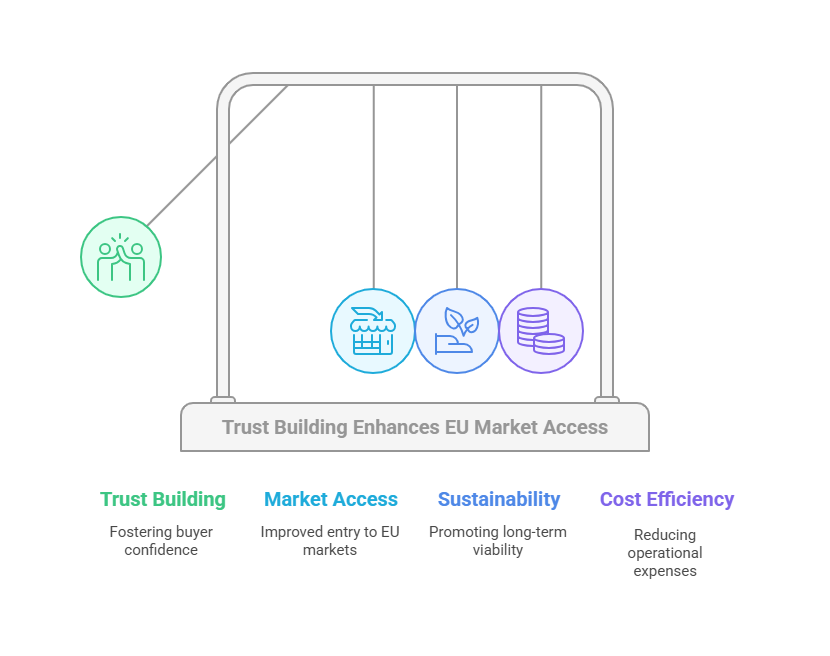Contact: +91 99725 24322 |
Menu
Menu
Quick summary: Learn how producers can minimize EUDR risk by ensuring deforestation-free supply chains through traceability, GeoJSON mapping, and advanced monitoring tools.

Global markets are placing increasing emphasis on sustainability, and the European Union Deforestation Regulation (EUDR) is setting a new benchmark for responsible sourcing. While this regulation aims to combat deforestation and protect ecosystems, it presents a significant challenge for producers—ensuring compliance in an increasingly complex supply chain. For many producers, EUDR risk in deforestation free supply chains comes down to a lack of transparency, incomplete data, and unreliable sourcing practices.
Without end-to-end visibility, they risk non-compliance, financial penalties, and losing access to lucrative EU markets. But with the right strategies and tools, producers can not only mitigate these risks but also strengthen their market position and reputation. Let’s explore how.
Key Takeaways
The European Union Deforestation Regulation (EUDR) is a game-changer for producers around the world, especially those involved in commodities like soy, palm oil, coffee, cocoa, rubber, beef, and wood. This regulation, which came into effect to curb global deforestation, places a clear mandate on businesses: prove your supply chain is deforestation-free, or risk losing access to the EU market.
At its core, the EUDR requires producers to:
These requirements are designed to protect forests and ecosystems, but they also demand a higher level of transparency and accountability than many producers are currently used to.
In 2021 alone, the EU imported commodities linked to 16% of global deforestation, valued at €72 billion. This highlights the scale of the issue and the urgency of compliance
The EUDR primarily targets commodities linked to deforestation, which are also major contributors to global trade:
The regulation acknowledges the environmental impact of these commodities, requiring producers to demonstrate they’re not contributing to illegal land-use changes or ecosystem destruction.
Non-compliance with the EUDR carries steep penalties that producers cannot afford to ignore:
The EUDR is not just a regulation—it’s a wake-up call for producers to prioritize sustainability. While the requirements may seem challenging, they also present an opportunity to modernize supply chains, strengthen relationships with ethical buyers, and gain a competitive edge in global markets.
Navigating the European Union Deforestation Regulation (EUDR) can feel like walking a tightrope for producers. The regulation is strict, and even small oversights can lead to non-compliance, financial penalties, or loss of market access.
For many producers, tracing every step of the supply chain is easier said than done. Supply chains are often fragmented, with raw materials passing through multiple hands before reaching their final destination.
Example:
Imagine a cocoa producer in West Africa. Cocoa beans are collected from hundreds of smallholder farmers and sold to intermediaries before being exported. Without a robust traceability system, it’s nearly impossible to confirm that all the beans come from deforestation-free farms.
Why It’s a Risk:
Under EUDR, producers must provide geolocation data for every batch of raw materials. Without this, they risk failing compliance audits.
Inconsistent or missing documentation is another common pitfall. Producers often rely on outdated systems like spreadsheets or paper records, which can lead to errors or data gaps.
Example:
A palm oil exporter in Southeast Asia might provide records for 80% of its supply chain but lack details for the remaining 20%. This inconsistency creates red flags during EUDR audits.
Why It’s a Risk:
Incomplete documentation can result in delays, rejections, or even penalties. Authorities require detailed proof that all raw materials are deforestation-free.
Some regions are more prone to illegal deforestation than others, and sourcing from these areas comes with heightened scrutiny.
Example:
Beef producers in Brazil, where the Amazon rainforest is a deforestation hotspot, face challenges in proving their supply chains are sustainable. Even if the producers are compliant, indirect suppliers might not be.
Why It’s a Risk:
High-risk regions require additional due diligence, which can be time-consuming and costly. Failing to prove compliance can result in a total ban on exports to the EU.
Greenwashing—making false or exaggerated claims about sustainability—can backfire under EUDR’s strict due diligence requirements.
Example:
A coffee exporter in Central America markets its beans as “eco-friendly” but cannot provide documentation to prove they are sourced from deforestation-free farms. This can lead to accusations of greenwashing and loss of credibility.
Why It’s a Risk:
Greenwashing undermines trust and increases the likelihood of penalties if claims are found to be false. It can also damage long-term relationships with ethical buyers.
Complying with the European Union Deforestation Regulation (EUDR) requires proactive strategies. Producers need to address traceability, risk assessment, and monitoring to meet the regulation’s strict requirements. Here’s how you can minimize EUDR risks with practical, actionable steps.
Creating a transparent supply chain is no longer optional—it’s a necessity under EUDR. Producers must trace the journey of raw materials from their origin to their final destination.
How to Do It:
Discover how GeoJSON mapping transformed compliance for this tire manufacturer.
Read the full case study now
Understanding where risks lie in your supply chain is critical to compliance.
How to Do It:
Suppliers play a crucial role in ensuring compliance, but many may not fully understand EUDR requirements.
How to Do It:
Technology is your ally when it comes to staying compliant and minimizing risks.
How to Do It:

Navigating the complexities of EUDR compliance can feel overwhelming, especially when dealing with intricate supply chains and strict regulatory requirements. That’s where TraceX steps in with the EUDR Compliance Platform designed to simplify compliance and empower businesses to build sustainable, deforestation-free supply chains.
TraceX leverages blockchain technology to provide full visibility across your supply chain. Every step, from sourcing raw materials to the final product, is securely recorded on a tamper-proof ledger. This ensures that data is accurate, transparent, and readily available for audits or reporting purposes.
A Nigerian firm successfully improved data accuracy and operational efficiency by adopting TraceX’s solutions. With enhanced supply chain traceability, the company ensured compliance with the EU Deforestation Regulation (EUDR) and reinforced its commitment to sustainable sourcing practices, showcasing their dedication to quality and regulatory standards.
TraceX integrates geospatial monitoring tools, including GeoJSON mapping, to identify and mitigate deforestation risks. By using satellite data and advanced algorithms, the platform helps businesses pinpoint sourcing regions, assess their compliance, and proactively address potential issues.
Meeting EUDR requirements involves extensive documentation, from due diligence declarations to traceability reports. TraceX automates this process by generating detailed compliance reports that are ready for submission to regulatory authorities. This saves businesses time, reduces human error, and ensures all necessary information is aligned with legal standards.
Minimizing EUDR risk in your supply chain is not just about meeting regulatory requirements—it’s about demonstrating a strong commitment to sustainability. By implementing traceability solutions, leveraging technology like GeoJSON mapping, and working closely with suppliers, producers can ensure their supply chains are deforestation-free and aligned with global standards. Taking these proactive steps will not only help avoid penalties but will also build consumer trust and contribute to the preservation of the environment.
The EU Deforestation Regulation (EUDR) is a law requiring companies to ensure their supply chains are free from products linked to deforestation. Producers must comply to avoid penalties and contribute to global sustainability efforts.
Traceability solutions, such as blockchain and GeoJSON mapping, provide transparency, ensuring all materials sourced meet deforestation-free requirements and can be tracked from origin to final product.
Suppliers must be educated and involved in the compliance process. Close collaboration helps ensure they meet sustainability standards, reducing overall risk and contributing to a more transparent supply chain.
